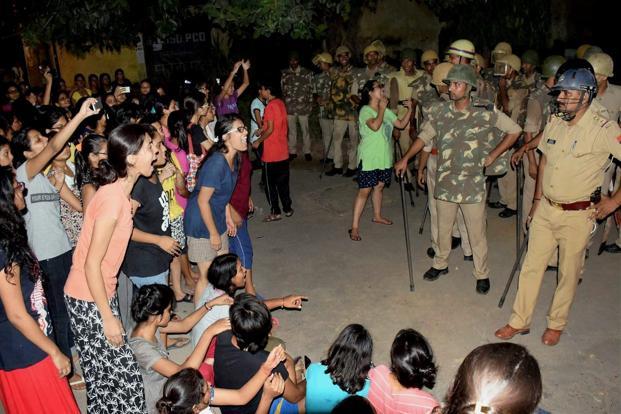
New Delhi: The last few weeks saw the campus of Banaras Hindu University (BHU) witnessing massive protests by students who felt that the administration’s response to complaints of sexual harassment were inadequate.
According to several students, this was not a one-off incident and women on campus were constantly subjected to harassment with the administration paying no heed to their complaints. “Each time any of us tried to complain, the administration would try to brush the matter under the carpet,” says Chandni Patel, a second-year MA student at BHU. “However, this time, counter-questioning on what was the complainant doing outside in the evening made the students even angrier.”
According to Mary E. John, senior fellow, Centre for Women’s Development Studies, Delhi, universities’ understanding of sexual harassment is often limited. “Universities are public spaces where men and women from diverse backgrounds interact with each other, often for the first time and since their socialisation processes are different, there can be awkward situations,” she says. “Often administrative authorities tend to dismiss sexual harassment incidents as instances of relationships turning sour or employ tactics such as finding faults in the complainant’s behaviour.”
In 2013, the UGC set up the SAKSHAM committee, a task force to review the measures for ensuring the safety of women on campuses and programmes for gender sensitisation, in the wake of the 16 December rape case. The report found that “the weakest aspect of our institutions of higher education is their lack of gender sensitivity.” It further suggested that “in the context of institutions of higher education, the nature of combating sexual harassment as an alternative civic redressal system can and must be given its fullest scope.”
But alternative civic redressal systems in the form of Gender Sensitisation Committee Against Sexual Harassment (GSCASH) and the Internal Complaints Committee (ICC) on campuses require administrative cooperation. The first student-led GSCASH body which was set up in Jawaharlal Nehru University (JNU) in 1999 was scrapped by the administration through a notification dated on 18 September on the basis of the UGC (Prevention, Prohibition and Redressal of Sexual Harassment of Women Employees and Students in Higher educational institutions) Regulations 2015 that was notified in 2016. In protest, students held elections to the GSCASH and appealed in the Delhi High Court where the matter is currently pending.
In an open letter to the JNU administration, members of the SAKSHAM task force said, “We are consequently at a loss to understand why what appeared to be a well functioning body in JNU needed to be disbanded and could not seamlessly incorporate an ICC.”
For instance, in the case of University of Hyderabad (UoH), the GSCASH had already been constituted in 2016 when the UGC notification came out. “The administration tried to use the new notification to re-constitute the GSCASH and bring in faculty members who had no academic understanding of gender and include those who were closer to the administration,” says Firdaus Soni, student representative of the UoH GSCASH, 2016-17.
“However, students protested and the GSCASH brought out comprehensive policy documents of the committee’s vision to account for the fact that the university was different from other workplaces as students too were key stakeholders.” The GSCASH was subsequently incorporated within the ICC at UoH with the ICC performing gender sensitization functions as well, adds Soni.
Concurs John, “The ICC is for workplaces, mandated under the Sexual Harassment of Women at Workplace (Prevention, Prohibition and Redressal) Act, 2013 and universities’ characters are unique in the sense that as sites of power play, those in positions of power such as professors or supervisors could seek favours from students who are not employees.”
Further, often, there are conflicts of interest as students may not want other students or members of their departments to know about the incident. “In 10 months, we received 15 complaints as the ICC was the first point of contact for students to report such incidents without any stigma,” says Soni.
However, the jury is out on whether the ICC itself is just a body that investigates complaints of sexual harassment or does it also work towards the prevention of such occurrences. “The ICC also undertakes gender sensitisation related activities to ensure gender equity and equality on campuses,” says Namita Ranganthan, president, ICC, University of Delhi. “While a formal complaint is required within 90 days, the ICC generally does not entertain anonymous complaints.” According to Ranganathan, the ICC recommends disciplinary action, not necessarily police action, though complainants are free to go to court.
John, however, makes a distinction between the ICC and GSCASH as while the former performs a semi-punitive function, the latter is envisaged to perform educative and pedagogical functions in helping students understand about gender and sexuality. “Universities are spaces where students learn new ideas about almost everything including how to approach their peers and not all situations can be addressed through punishments alone,” she adds.
The purpose of a holistic ICC is to create student-friendly institutions on campus so that if students can’t access institutions like the police, the institution comes to them so that they feel safe on campus, adds Soni.
According to Patel, there is an urgent need for the larger society to come to terms with the changing gender dynamics. “Members of the administration are also members of the society and their mindset reflects the larger society’s mindset,” concludes Patel.
[“Source-livemint”]
